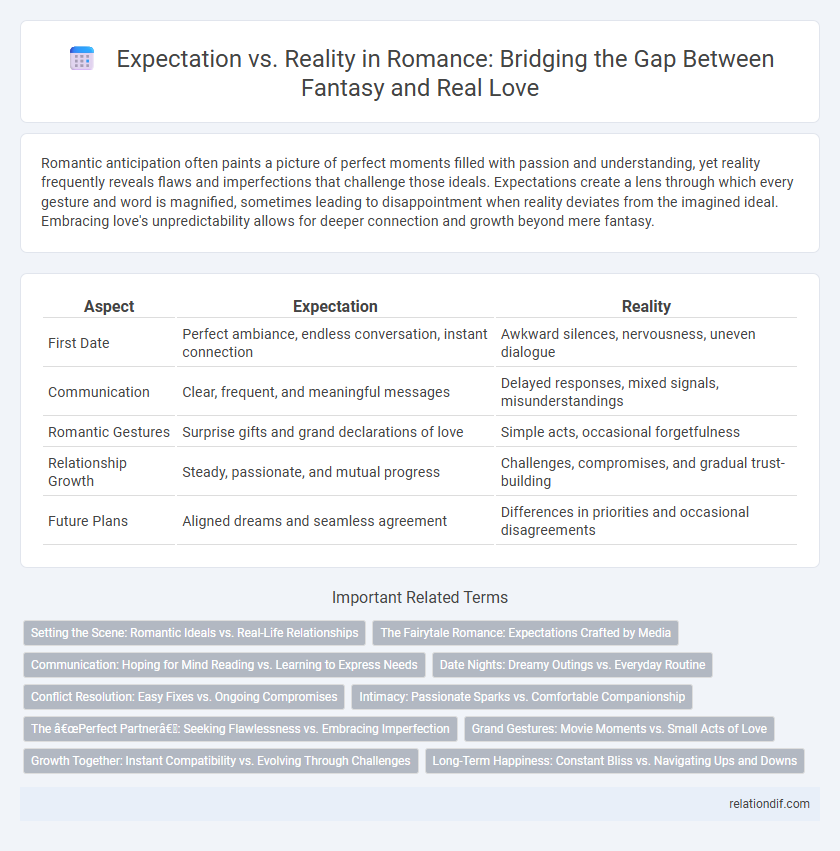Romantic anticipation often paints a picture of perfect moments filled with passion and understanding, yet reality frequently reveals flaws and imperfections that challenge those ideals. Expectations create a lens through which every gesture and word is magnified, sometimes leading to disappointment when reality deviates from the imagined ideal. Embracing love's unpredictability allows for deeper connection and growth beyond mere fantasy.
Table of Comparison
| Aspect | Expectation | Reality |
|---|---|---|
| First Date | Perfect ambiance, endless conversation, instant connection | Awkward silences, nervousness, uneven dialogue |
| Communication | Clear, frequent, and meaningful messages | Delayed responses, mixed signals, misunderstandings |
| Romantic Gestures | Surprise gifts and grand declarations of love | Simple acts, occasional forgetfulness |
| Relationship Growth | Steady, passionate, and mutual progress | Challenges, compromises, and gradual trust-building |
| Future Plans | Aligned dreams and seamless agreement | Differences in priorities and occasional disagreements |
Setting the Scene: Romantic Ideals vs. Real-Life Relationships
Romantic ideals often paint relationships as flawless and endlessly passionate, fueled by grand gestures and perfect moments. Real-life relationships involve navigating everyday challenges, communication quirks, and growth through imperfections. Understanding this contrast helps couples build authentic connections grounded in empathy and resilience.
The Fairytale Romance: Expectations Crafted by Media
Fairytale romances portrayed in media often set unrealistic standards of love, emphasizing perfect chemistry, grand gestures, and flawless relationships that rarely align with real-life complexities. These portrayals create expectations of effortless passion and instant connection, overshadowing the importance of communication, compromise, and growth in actual romantic partnerships. The contrast between idealized media narratives and authentic experiences frequently leads to disappointment and unmet emotional needs.
Communication: Hoping for Mind Reading vs. Learning to Express Needs
Expecting a partner to read your mind often leads to misunderstandings and frustration, as unspoken desires remain unnoticed. Clear communication of needs fosters emotional intimacy and ensures both partners feel heard and valued. Expressing feelings openly transforms assumptions into shared understanding, strengthening the romantic connection.
Date Nights: Dreamy Outings vs. Everyday Routine
Date nights often conjure images of candlelit dinners and starlit walks, but reality usually involves casual meals and simple conversations at home. The dreamy outings portrayed in media create high expectations that rarely align with everyday routines shaped by busy schedules and comfort. Embracing the beauty in these ordinary moments can deepen connection and redefine romance beyond idealized fantasies.
Conflict Resolution: Easy Fixes vs. Ongoing Compromises
Romantic conflicts often arise from the clash between expectation and reality, where easy fixes may temporarily soothe tension but fail to address underlying issues. Effective conflict resolution requires ongoing compromises that foster mutual understanding and long-term relationship growth. Couples who embrace continuous communication and flexibility experience stronger emotional bonds and deeper intimacy over time.
Intimacy: Passionate Sparks vs. Comfortable Companionship
Passionate sparks often ignite intense moments of intimacy, characterized by excitement and raw emotion, creating an electrifying connection in romantic relationships. Comfortable companionship, on the other hand, cultivates a deep sense of trust and emotional safety, fostering long-term bonding through shared experiences and mutual understanding. Balancing fiery passion with steady companionship enhances relationship satisfaction and sustains intimacy over time.
The “Perfect Partner”: Seeking Flawlessness vs. Embracing Imperfection
The pursuit of the "perfect partner" often sets unrealistic standards that lead to disappointment and unmet expectations in romantic relationships. Embracing imperfection allows for deeper emotional connection, fostering trust and genuine compatibility between partners. Recognizing that flaws contribute to individuality transforms relationships into spaces of growth and mutual understanding.
Grand Gestures: Movie Moments vs. Small Acts of Love
Grand gestures in romance, often seen in iconic movie moments like public proposals or extravagant surprises, create dramatic expectations that can overshadow everyday expressions of love such as thoughtful texts or quiet support. Psychological studies reveal that small, consistent acts of affection build stronger relationship satisfaction over time compared to one-time grand displays. Romantic relationships thrive on genuine connections underscored by meaningful daily interactions rather than cinematic spectacle.
Growth Together: Instant Compatibility vs. Evolving Through Challenges
Instant compatibility often creates a false sense of effortless romance, while true growth emerges from navigating challenges and evolving together over time. Couples who face conflicts and overcome obstacles develop deeper emotional bonds, fostering resilience and mutual understanding. Embracing the reality of growth through shared experiences enriches the romantic connection far beyond initial attraction.
Long-Term Happiness: Constant Bliss vs. Navigating Ups and Downs
Long-term happiness in romance often contrasts the expectation of constant bliss with the reality of navigating ups and downs. Couples who embrace challenges and communicate effectively tend to build deeper emotional bonds and resilience. Sustained relationship satisfaction arises from mutual support and adapting to change rather than avoiding conflict.
expectation vs reality Infographic

 relationdif.com
relationdif.com